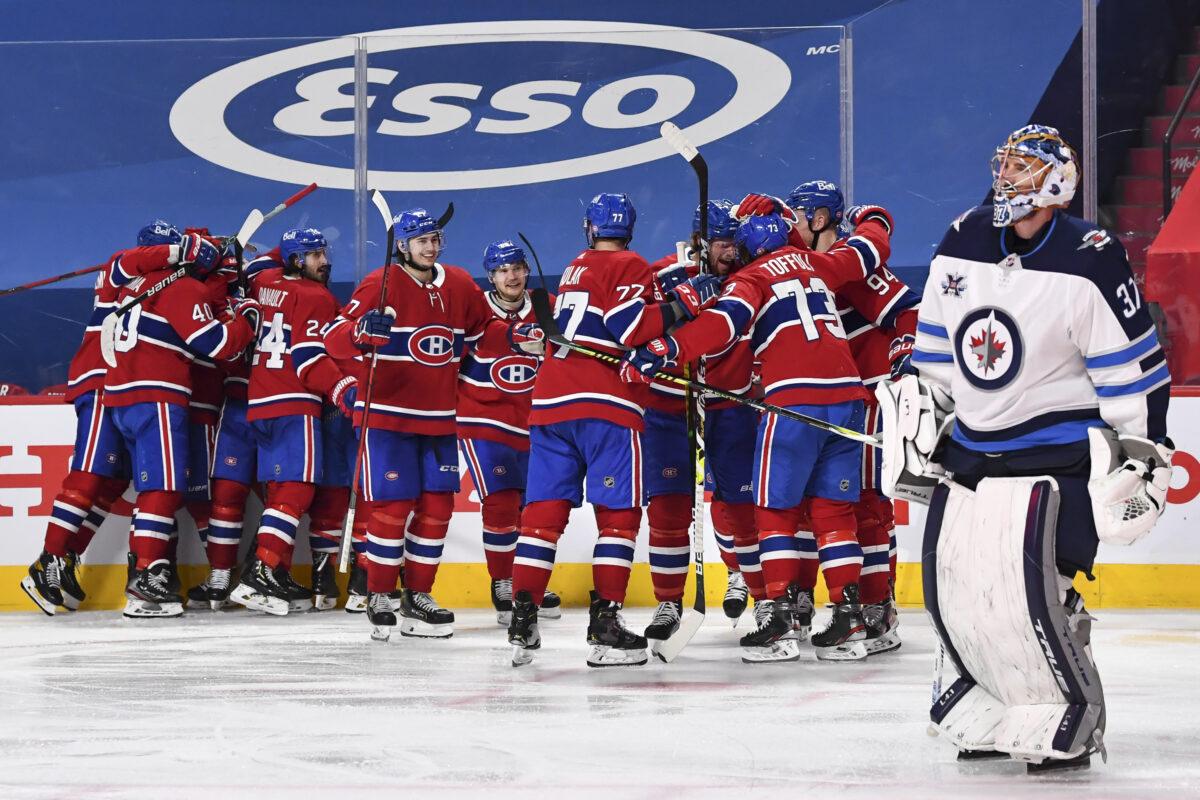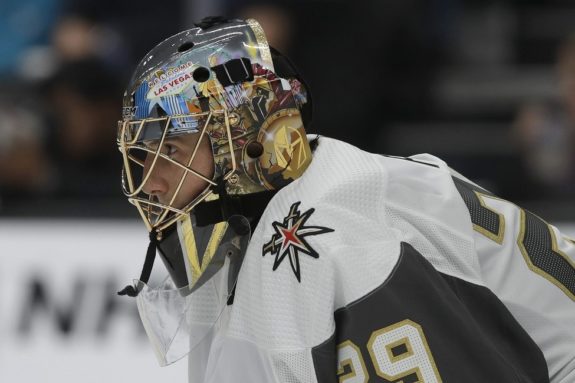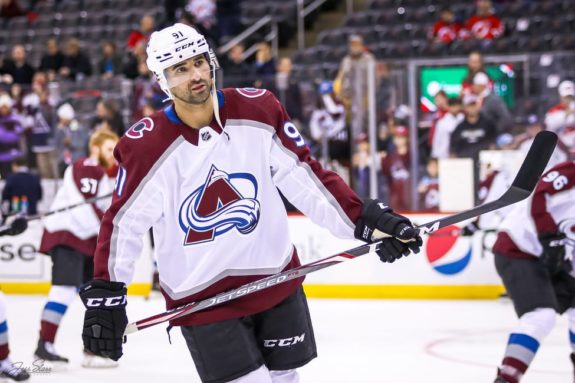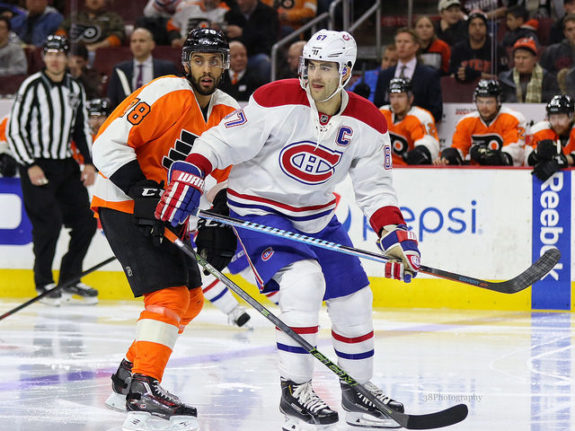The Vegas Golden Knights are arguably to the Colorado Avalanche what the 1977-78 Montreal Canadiens are to the 1976-77 edition: Scary, but it could be worse. In other words, the 2020-21 Canadiens are in trouble, but they’ve got more of a chance against their soon-to-be third-round opponents than the team the Knights just beat in six games.
How could that be, you might ask? Well, just like the Canadiens beat the Toronto Maple Leafs in Round 1, which never gets tiresome to say, upsets do happen, even if in the case of the Golden Knights it wasn’t as big of one. Indeed, while the Avalanche won the Presidents’ Trophy, the Knights missed out by the slimmest of margins.

The Knights actually led the Avalanche in overall wins during the regular season (40 to 39). However, the two sides were tied in points in the standings (82), and even regulation and overtime wins (ROW; 39). However the Avs owned the second tiebreaker (ROW is third) with 35 regulation wins to 30.
So, considering the Golden Knights even had a higher goal differential in the regular season, it was maybe an upset the same way March is spring in Montreal: on paper only. Regardless, even if you believe the Golden Knights were actually the better team, there’s a good argument to be made the Habs simply match up better against them… three actually:
3. Carey Price Edges Marc-Andre Fleury in Net
Yes, Marc-Andre Fleury has had a great season. He’s justifiably a Vezina Trophy finalist after having gone 26-10 with a 1.98 goals-against average and .928 save percentage. Regardless, in net is the only place where the Canadiens have a potential advantage in theory.

It isn’t simply in regard to Carey Price’s league-leading .935 save percentage in the playoffs (.923 for Fleury). It’s a nod to Fleury’s history of playoff letdowns, for which he at one point saw a sports psychologist. One of those letdowns was actually at the hands of the Canadiens themselves, back in 2010, when the Habs beat the Stanley Cup-champion Pittsburgh Penguins 4-3 in the second round.
Those playoffs, Fleury had a save percentage below .900 (.891), the first of four straight such postseason runs. True, he didn’t exactly do worse against the Canadiens than the Ottawa Senators in Round 1 (approximately same level of performance). So, it’s not like the Canadiens specifically were in his head, but they do have the propensity to be considering the stage that is the Bell Centre for a Quebec native. Even so, in the deciding Game 7 that year (in Pittsburgh), he got pulled with everything on the line, allowing four goals on 13 shots, lasting less than half the contest.
To be fair, Fleury has turned his postseason reputation around and everyone loves a good redemption story… maybe almost as much as a good underdog story with the Canadiens being the protagonists in this one. If the Canadiens are going to move on to their first Stanley Cup Final since 1993, they’ll have to get through Fleury, which by many accounts is an easier proposition relative to Philipp Grubauer of the Avalanche.
2. Canadiens Avoid Avalanche and Kadri
Speaking of the Avalanche, they weren’t really playing a full deck, were they? It’s both a reference to them having had to deal with the loss of forward Nazem Kadri to a suspension and Nazem Kadri getting suspended yet again due to not playing with a full deck himself.

The Canadiens have received a lot of hate by non-fans who claim they only got past the Winnipeg Jets because Mark Scheifele got suspended for his Game 1 charge on Jake Evans. The Golden Knights not so much, even though they benefited from one of the Avalanche’s more effective forwards being out of the lineup the length of the series.
Granted, Scheifele plays above Kadri in the two teams’ respective lineups and is considered more valuable overall. However, Kadri, who, played 16:28 per game to Scheifele’s 20:58 during the regular season, is still a two-time 30-goal scorer who needs to be respected for his on-ice ability. Furthermore, on a stacked Avalanche team, he is one more weapon who scored 18 points in 15 playoff games last postseason, ranking third just after the usual suspects in Nathan MacKinnon and Mikko Rantanen.
Ultimately, just like the Golden Knights didn’t have to contend with a complete Avalanche lineup, neither will the Canadiens, with Kadri having been poised to return had the Avalanche not gotten eliminated in Game 6. In a sense, they dodged a bullet, with a re-ignited Battle of Quebec (Quoloarado? Dentreal?) hopefully to start up again at a later date instead.
1. The Max Pacioretty Factor
Obviously, avoiding MacKinnon, as one of the top (two, three?) players in the world is a bigger deal than avoiding Kadri. There’s no disputing that.
In much the same way, the Canadiens arguably drew the better match-up in Round 1, taking on and beating the top-seeded Maple Leafs (Reference No. 2, for those counting at home). Had they finished No. 3 in the North Division standings, they would have faced the Edmonton Oilers and Connor McDavid instead. McDavid and Leon Draisaitl are such x factors that it actually made sense for the Habs to prefer facing Auston Matthews and Mitch Marner.
Not that Matthews and Marner are bad players (depending on who you ask these days). In fact, they’re very much in the same league as McDavid and Draisaitl. It’s more so the emotional impact of playing against a team with which there is so much history. Without having been in the Habs locker room to say for sure, one would have to objectively assume it would have been much easier for the Habs to pack it in down 3-1 against the Oilers than it was against the Leafs, who would have moved on to the second round for the first time since 2004 on the Habs’ watch.
It has to be seen as a similar situation, going up against ex-captain Max Pacioretty, He’s obviously resurrected his career in a big way after having been traded to the Golden Knights for Nick Suzuki and Tomas Tatar (and a second-round pick). Nevetheless, he probably still has a lot to prove after having effectively been scapegoated for the Habs’ lack of success, which arguably continued on for two more seasons after the trade, with a new captain (Shea Weber) and everything.

After all, Pacioretty is a guy with whom Hall-of-Famer Guy Lafleur said the Canadiens can’t win. Nothing would likely be sweeter for him than to help his Knights eliminate his former Habs. And, while Brendan Gallagher said in a recent media-availability session that it’s a non-issue, it’s at least easier to believe it’s a different story for Pacioretty. And, if it’s a different story for Pacioretty, it’s quite possibly a different story for the Canadiens, regardless of what they say to the media.
True, it’s hard to prove around which sentiments exactly the Canadiens choose to rally. Maybe it’s exactly like Gallagher says, but logically the Canadiens stand to put up more of a fight if there’s more than a trip to the Stanley Cup Final at stake in this round.
Just like the Leafs, who the Habs beat in Round 1 against all odds (Reference No. 3), the Knights are better opponents for them in Round 3 because Pacioretty is more that just a guy in their way. The Canadiens luckily drew an opponent that at the very least should get the blood of Canadiens fans pumping harder. You have to hope the same is true for the Habs themselves.
Pacioretty is obviously no McDavid or Matthews. However, he is undeniably a solid top-line winger who was arguably unjustifiably traded away. He’s also key part of a complete team from top to bottom that makes for an undeniably titanic opponent in the third round, compared to the colossal Avalanche. However, the Titanic sank and the mythological Titans themselves lost in battle. In reality, the Battle of Quebec has been over for 25 years. In the here and now, the battle against the Knights now holds infinitely more significance.
Much like the Canadiens just upset the Maple Leafs (No. 4) or the Presidents’ Trophy-winning Washington Capitals under similar circumstances in 2010, a victory here is definitely possible. Counting out the Canadiens at this point is kind of premature, just like Pacioretty in a Habs uniform, or winter in Montreal in spring. With the pandemic and the season only starting in January, “winter” is technically lasting a whole lot longer. A few more weeks to make it past Round 3 certainly won’t hurt anyone, especially with all of Montreal having waited seven years to get to this point once again.